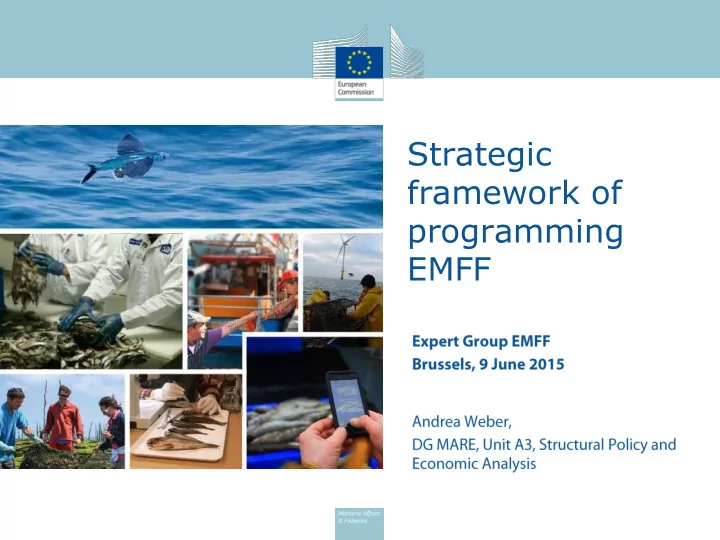

Strategic framework of programming EMFF
Challenges of the new programming period 1. Fitting EMFF into the wider context of the ESI Funds 2. The shift of certain policy elements from direct management to shared management 3. Better coordination within EU funds and exploiting synergies and complementarities 4. Putting into practice the new provisions of the partnership principle 2
Fitting EMFF into the wider context of the ESI Funds – Partnership Agreements The Partnership Agreement shall • ensure a consistent and coherent approach of the MS to the national strategy of achieving the objectives of the Union strategy of smart, sustainable and inclusive growth; • cover all ESI Funds; • be drawn up in partnership with all relevant stakeholders; What we experienced: • EMFF stakeholders – even at governmental level – were often left out from the programming exercise; • Almost all PAs needs to be adjusted after the adoption of the OPs that shows the weaknesses in national level overall programming; 3
Fitting EMFF into the wider context of the ESI Funds – Thematic concentration 4
Fitting EMFF into the wider context of the ESI Funds – Thematic concentration 5
Fitting EMFF into the wider context of the ESI Funds – Thematic concentration What we experienced: 1. Strategy: – lessons learned from 2007-2013 period are not made use of; – intervention logic is not consistent and often lacks sufficient link to strategy – In some cases, the strategy remains generic, not adapted to specific context 2. Thematic Objectives – Except some cases, no real focus and thematic/financial concentration (that result in fragmentation of financial resources among high number of measures) 6
The shift of certain policy elements from direct management to shared management 7
The shift of certain policy elements from direct management to shared management • What we experienced: • Relatively less problems with compensation and storage aid; • Individual elements are not fully integrated into the strategy and the overall logic; • General uncertainty over the types of eligible activities; • Specifically in relation to data collection: • Difficulties with integrating the policy implementation structure into the EMFF management system; • Specifically in relation to control and enforcement: • Catch certification scheme, traceability rules often not fully integrated • Types of operation and their link to the priorities of the Union in control and enforcement are sometimes not indicated 8
Better coordination within EU funds and exploiting synergies and complementarities Experiences so far: – Coordination and complementarities with EAFRD are traditionally good; – Signs of better institutional coordination with cohesion policy competent authorities; – Generally good description of complementarity with other OPs; Room for improvement: – Link to Leader should be better highlighted; – Synergies to LIFE and HORIZON 2020 should be sought; – Reference to macro/sea basin strategies should not be forgotten; – Financial instruments – where there is no critical mass and economies of scale, piggy- backing on ERDF should be further explored; 9
Putting into practice the new provisions of the partnership principle • Delegated Regulation (EU) No 240/2014 of 7 January 2014 on the European code of conduct on partnership in the framework of the ESI Funds – Identification of partners; – Involvement of partners in the elaboration of OPs; – Involvement of partners in further stages of the programming cycle; – Minimum requirements towards the monitoring committee; • What we experienced : – Involvement of partners into the elaboration of the OP and the monitoring committee is mostly fulfilled (even for new policy elements); – The role of partners within the monitoring committee needs to be further enhanced (particularly by balanced voting rights) 10
Recommend
More recommend